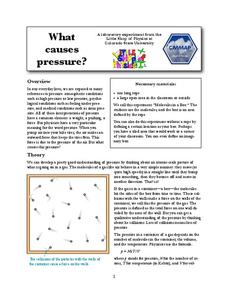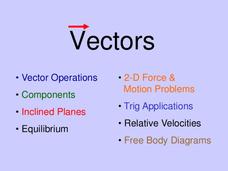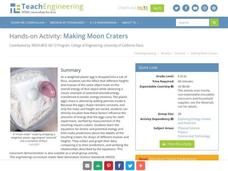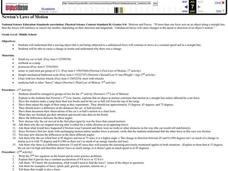CK-12 Foundation
Model Rocket
Acceleration, velocity, mass, and gravity all play a role in the motion of a rocket. Young scientists explore the connection among these components using an interactive tutorial. They adjust the mass and thrust force to experiment with...
DiscoverE
Air-Powered Mini Rocket
Does the position of the clips make a difference? The activity provides directions to build and test a paper rocket. Pupils attach paper clips to the rocket in different configurations and measure the distance the rocket flies each time....
Cornell University
Physics of Flight
Up, up, and away! Take your classes on a physics adventure. Learners explore the concepts important for flight. They experiment with the Bernoulli Principle while learning the forces that act on airplanes in flight.
Museum of Science
Balloon Racers
Watch those balloon cars go! Scholars build racers that run using the power of balloons and conduct races with the cars. They learn about Newton's third law of motion and how it applies to their balloon racers.
Teach Engineering
Ramp and Review (for High School)
Rolling for momentum. As part of a study of mechanical energy, momentum, and friction, class members experiment rolling a ball down an incline and having it collide with a cup. Groups take multiple measurements and perform...
NASA
Applying Newton’s Laws
Newton's Laws get the rocket to work, but do they serve any other functions? A six-page resource classifies rockets by the type of propellant they use. It then describes applications of Newton's Laws of Motion, both in the...
Colorado State University
What Causes Pressure?
Are you feeling the pressure? Let loose a little with a kinesthetic activity that models molecular motion in a closed space! The activity varies conditions such as volume and temperature and examines the effects on molecules.
Science Geek
Kinetic Molecular Theory
The fourth presentation in a series of five begins with information about the nature of gases and what to expect from them. Then it discusses kinetic molecular theory, diffusion, and Graham's Law, and concludes with the purification of...
Urbana School District
Vectors
I don't always make vector jokes, but when I do, IJK. Vector addition using multiple methods, scalar multiplication, vector subtraction, vector components, relative velocities, free body diagrams, and so much more Are covered in this...
Workforce Solutions
Newton's Laws
Two lessons explore the connection between energy transformation and a given job. In lesson one, small groups role-play a scenario that showcases the energy transformations that may take place during a job-specific task. The second...
Colorado State University
Why Do Raindrops Sometimes Land Gently and Sometimes with a Splat?
A mouse can fall from large heights without injury! Air resistance is a large influence on small falling objects. In an exploratory lesson, young scholars build a raindrop bottle to compare the falling rate of different-sized objects.
American Museum of Natural History
Create a Compass
Historically, humans have used many methods of finding due north. Using a hands-on activity, learners create their own compasses. They then test their compasses in their neighborhood or to assist with stargazing.
Teach Engineering
Making Moon Craters
Create an egg-citing study of energy. Pupils investigate the effect of height and mass on the overall amount of energy of a falling object. The fourth segment in a six-part series on energy uses a weighted egg falling from different...
Missouri Department of Elementary
Fatal Accident
While there may not be any ghostbusters in the neighborhood, there are plenty of emergency response agencies ready to give support if something is amiss. To that end, instructors invite a member of an emergency response agency to address...
Curated OER
Motion
Sixth graders read about and study motion. They conduct a lab in which they calculate speed using track records at their school. They graph the results and then invite a guest speaker (an officer from the local police department) who...
Curated OER
Pangaea Puzzle: Exploring the Tectonic Forces That Shape the Earth
Sixth graders follow in the footsteps of early scientists as they put the pieces of Pangaea back together and discovered the forces that create the variety of landforms and sea-floor features of our Earth.
Aiken County Public Schools
Claymation in the Classroom
Students design an appropriate and usable storyboard and then create a claymation video. They take digital photographs frame by frame, then assemble the stop-motion movie using video software.
Curated OER
Magnetic Forces and Kinetic Energy
In this magnetic forces and kinetic energy worksheet, students use the formula that relates the speed of an electron in a plasma cloud to its energy to find the speed of 6 different plasma cloud electrons. They answer 5 questions that...
Curated OER
Rectilinear Motion
Twelfth graders rewrite word problems using algebraic expressions. In this calculus instructional activity, 12th graders calculate the velocity, time and acceleration while analyzing real life scenarios. They solve problems related to...
Curated OER
Chemistry in the Kitchen
Students, in groups, combine given materials from an everyday kitchen until a chemical reaction occurs and record the reaction time.
Curated OER
Energy and Change: The Five Basic Laws
Five basic law of physics and energy are listed here, with a simple explanation of what each actually means in the real world! Your young physicists will appreciate the concepts being made more relevant and the language being made more...
Curated OER
Identifying Forces
Students identify, describe and indicate direction and relative magnitude of forces. In this motion lesson students work in groups to identify the force that is described to them.
Curated OER
Newton's Laws of Motion
Young scholars perform three activities that each demonstrate one of Newton's Laws of Motion. They use a ramp and toy car to demonstrate inertia, calculate acceleration due to gravity, then use a medicine ball and rolling chair to...
Scholastic
Study Jams! Gravity & Inertia
Is it possible to defy gravity? Not really. With force and inertia, we can act against it for a little while, but, eventually, gravitational force will pull us back to Earth. The relationships among mass, force, and inertia are all...























